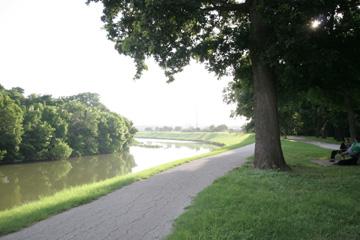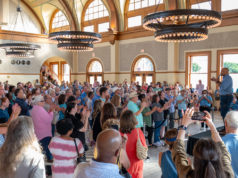When Colonial Country Club signed a contract in May to allow gas drilling under its property off University Drive, it joined the long line of Fort Worth institutions expecting to rake in a lot of the green stuff from the Barnett Shale boom. What’s more, the club will be able to reap those profits without having to put up with the noise and traffic of a gas rig.
 But the deal that’s making profits for Colonial apparently will end up costing local nature enthusiasts a lot of green of a different kind, when Chesapeake Energy Corp. cuts down a major part of an eight-acre stand of old-growth oaks, elms, and cedars along the Trinity Trail across the river from the country club. Jim Marshall, former owner of Marshall Grain Company, bikes along the trail frequently. “It’s such a beautiful grove of trees, one of the prettiest on Trinity Trails,” he said. “It would be horrible if a large number of trees were to be destroyed.” On other parts of the trail, Marshall has installed special “ box nests” that are helping re-establish the Eastern bluebird in Fort Worth.
But the deal that’s making profits for Colonial apparently will end up costing local nature enthusiasts a lot of green of a different kind, when Chesapeake Energy Corp. cuts down a major part of an eight-acre stand of old-growth oaks, elms, and cedars along the Trinity Trail across the river from the country club. Jim Marshall, former owner of Marshall Grain Company, bikes along the trail frequently. “It’s such a beautiful grove of trees, one of the prettiest on Trinity Trails,” he said. “It would be horrible if a large number of trees were to be destroyed.” On other parts of the trail, Marshall has installed special “ box nests” that are helping re-establish the Eastern bluebird in Fort Worth.
Marshall told Don Young, founder of Fort Worth Citizens Against Neighborhood Drilling Ordinance (FWCanDo), about Chesapeake’s plans, and Young was outraged. He said the grove is home to some of the biggest and oldest trees in Fort Worth. “In a more progressive city, these trees would be classified ‘Heritage Trees’ and be protected,” Young said. He has used Trinity Trails since the 1970s, when he was a boy. Back then, he said, “People seemed to care more about nature.”
Young and others say they don’t think most people who use the trail are aware of what may happen to the trees over the next several months. In the last few weeks, Young has been stopping people along the trail to ask them if they know about the plan. Everyone he has talked to was unaware of it, he said — and all were under the impression that the land is part of the city trail system.
He also contacted several groups, including Save Our Parks, a committee devoted to preserving Fort Worth’s parks, and the local chapter of the Sierra Club, as well as Fort Worth City Council member Wendy Davis, all of whom said there was nothing that could be done. The grove is on private property, Davis said, and there is no action the city can take to protect the land. Not even the city’s tree ordinance can help. Gas well sites are exceptions to the city’s Urban Forestry Plan, according to changes made in January to bring the plan into line with the city’s gas well ordinance. That means Chesapeake is free to clear the tract as long as it replaces a minimum of 30 percent of the trees removed — although there’s no rule about where the new trees must be planted. The company must submit its landscaping plans to the city before tree removal begins. The “replacement” trees must be a minimum of three inches in diameter.
Chesapeake spokeswoman Julie Wilson said the company will not need to clear the entire lot for drilling. Between three and five acres of land are generally required for well sites, she said. There will be more than one well site on the plot, with only one rig running at a time. “I understand when people are upset when trees are removed,” Wilson said. “The good news is we will not be clearing the entire lot and plan to save as many trees as possible.” Wilson also said that the land is better off under Chesapeake’s ownership. The prior owner planned to clear it completely in order to put up an apartment complex and a shopping center. Wilson represented Chesapeake at a meeting with Davis on June 21. Marshall attended the meeting and suggested that Chesapeake drill instead on one of its other properties. He suggested the company use Union Pacific property that is already industrialized, the University Park Church location that is going to be developed, or an open area just upstream from the Hulen Street bridge. If the company relocates the drilling site, Marshall said, it could turn the grove into a public park. Wilson said she would have her company check into Marshall’s suggestions, but she reminded him that the parcel of land was expensive. Turning the land into a park would mean losing a great deal of money.
Terry Jensen, vice-chairwoman of the Fort Worth chapter of the Sierra Club, was horrified when she learned about Chesapeake’s plans to remove the trees. She said it is “environmentally irresponsible” for the club to allow the trees to be cut down for profit. “We don’t have many woods left in Tarrant County,” she said. “Trees are beneficial to the environment and to people’s way of life. … We have an innate desire to enjoy nature. Some people seem to have forgotten about that.”
If Colonial Country Club wants the gas well royalties, she said, the club should “allow drilling on their own property.” Young said he has looked at Colonial’s land and that the country club has plenty of room for a well site without much inconvenience to club members or to nature. Colonial officials did not return repeated calls about their part in the deal. If Chesapeake goes ahead with plans to drill on the site, the company will do what it can to preserve the site’s beauty, including by planting replacement trees in the area, Wilson said. “With Chesapeake’s focus on … being good stewards to the environment, we will be as responsible as possible while still taking care of our stakeholders,” she said.
The planting of new trees to replace the old is not an acceptable alternative, in Young’s eyes. “When they plant a sapling to replace an old tree, who’s gonna be here in 200 years to see that sapling?” he said. “Gas drillers are ruining this city, slowly but surely.” Bernie Scheffler, co-owner of Panther City Bicycles, rides his bike along Trinity Trails every day. The grove is one of his favorite spots to rest. “That’s the most pleasant grove of trees along the whole trail,” he said. Scheffler said his many customers who use Trinity Trails have been unaware of the planned drilling until he tells them about it. They are surprised and saddened by the news, he said. Most of them thought the land was owned by the city. “In a sense it’s nice that we could use private land for so long,” he said. Gas wells in urban areas are noisy, traffic-generating eyesores, the bike store owner said. “The best option for getting it stopped is going to be citizen protest,” he said. “It’s a big misconception that gas companies are unstoppable. People are going to have to band together and be vocal about what they want.”











